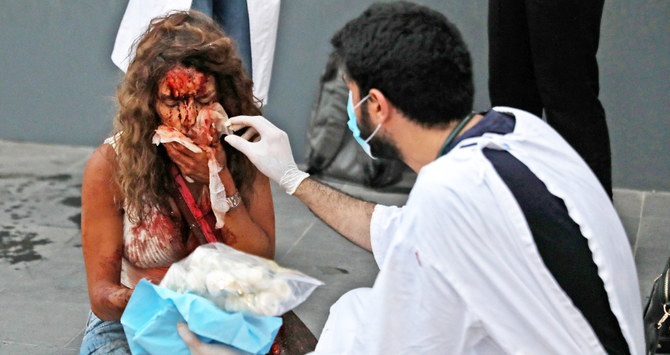DUBAI: Badly injured people began streaming into Beirut’s Clemenceau Medical Center within hours of the explosion that devastated large parts of the capital on Tuesday evening.
Some were hurt inside their apartments by shattered glass and falling objects; others suffered severe injuries while going up in elevators or climbing stairs; still others were bloodied by falling masonry and debris while they were out in the streets.
By late on Wednesday, the number of people hurt in the explosions at Beirut port had reached 5,000, with the death toll rising above 135.
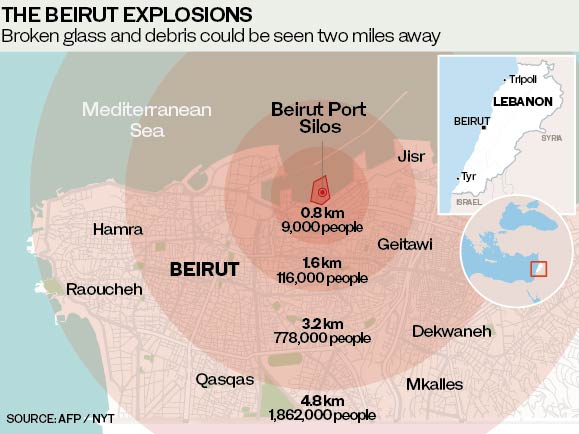
“Blood was everywhere,” Dr. Walid Alami, a cardiologist at Clemenceau Medical Center, told Arab News from Beirut, as he recounted the events of a night that began with the hospital asking all its off-duty nurses and doctors to report for duty immediately.
He said a large number of patients, many of them children, suffered eye injuries and loss of vision caused by broken pieces of glass.
“I am 58. I have lived through the civil war and treated patients during the 2006 invasion. I have never seen anything like this,” Alami said. “We have never had a bomb that caused destruction over a wider radius.”
He added: “We handled the crisis well given that we haven’t had to confront anything like this since the 2006 war (with Israel). We dealt with many casualties in a very short period of time.”
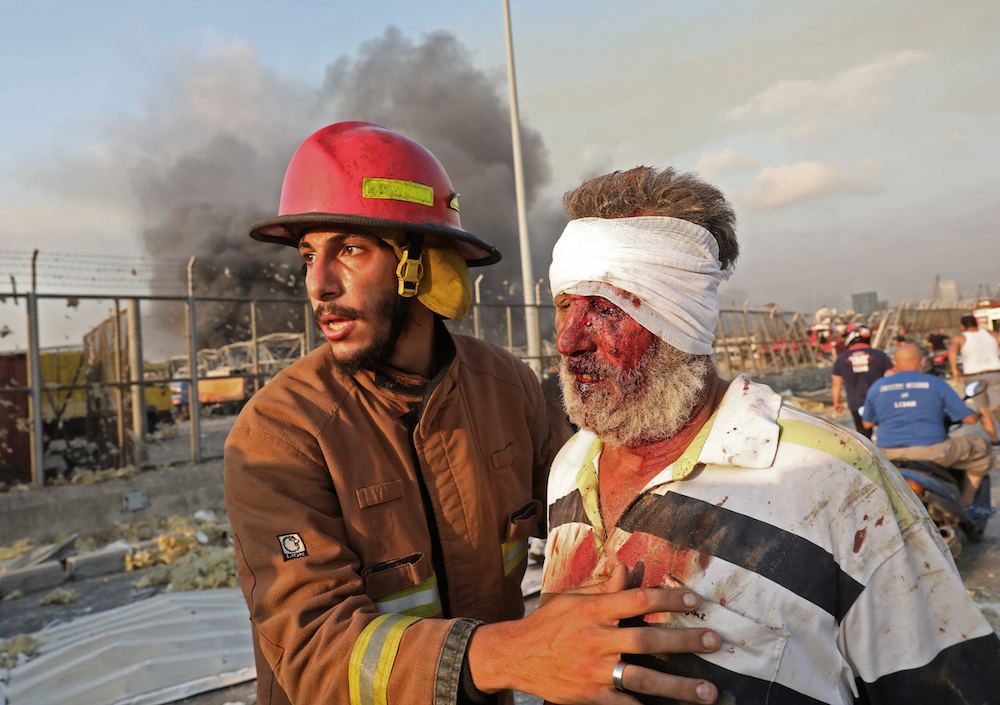
A wounded man is helped by a fireman near the scene of an explosion in Beirut on August 4, 2020. (AFP)
The explosions could not have come at a worse time for Lebanon’s health system, which has been ailing for months owing to the economic collapse, electricity shortages and a second wave of coronavirus infections.
Lebanon imposed a two-week lockdown on July 30 after the health minister warned that the pandemic was taking a “dangerous turn.” But on Tuesday, Beirut’s hospitals faced a totally unexpected health emergency.
Among those who suddenly found themselves on the front line was Dr. Ramzi Alami, a surgeon at the American University of Beirut Medical Center.
“Like most hospitals in Beirut, we were completely inundated last night,” he told Arab News. “We had to turn so many people away, which was one of the biggest challenges for our staff. We kept the corridors open so that we could bring in the seriously injured.
“I don’t know how to describe what we were doing last night. We were treating patients in the hallways, on the floor — all over the place. There was a power cut early on, so we were treating patients in the dark. It’s indescribable what we experienced and what we saw.”
He said the most serious cases involved internal head injuries, including brain trauma.
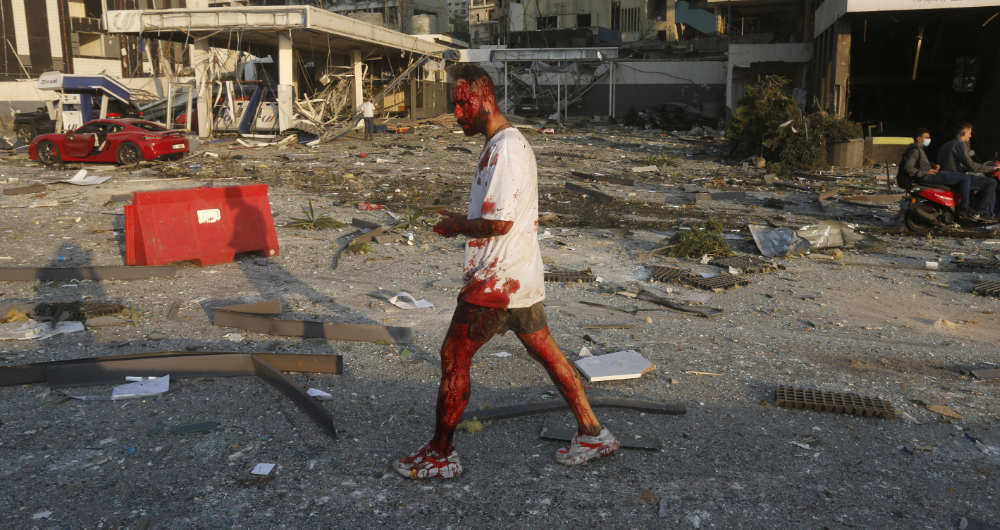
The number of people hurt in the explosions in Beirut port had reached 5,000, with the death toll rising above 135. (Photo supplied by Marwan Tahtah)
“Due to the intensity of the explosion, people got thrown from different positions or tossed into the air or hurled against walls. There were lots of lacerations, cuts and bleeding from shattered glass.”
In total the medical center had 55 major cases admitted overnight. People with less serious injuries were sent to smaller hospitals in the vicinity or elsewhere.
The explosions left some hospitals in Beirut cut off from the power grid and unable to get damaged generators up and running.
Dr. Samir Challita, based in Byblos, said patients began arriving from Beirut, 30 km away, when its hospitals began to run out of capacity.
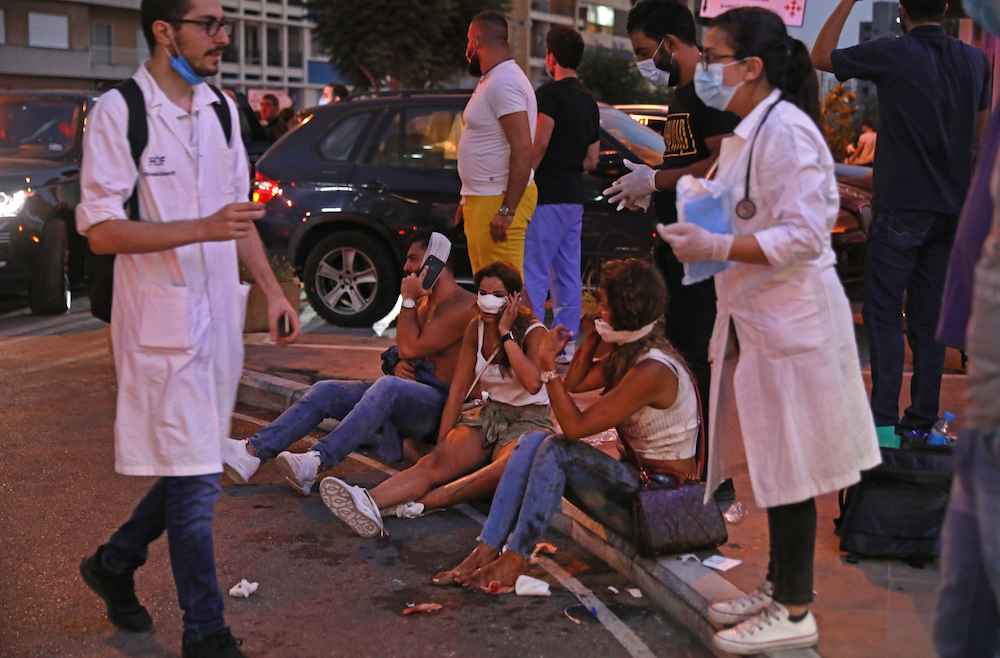
Injured people sit on the pavement as medics walk past outside a hospital following an explosion in the Lebanese capital Beirut on August 4, 2020. (AFP)
Lebanon has not been abandoned in its hour of need. Planes carrying aid from GCC countries have begun arriving at Rafic Hariri Airport. The EU has said it will send about 100 firefighters and other search-and-rescue support.
President Donald Trump said the US was “ready to assist Lebanon,” while Israel, with which Lebanon is technically still at war, said it would support its neighbor with “humanitarian and medical aid.”
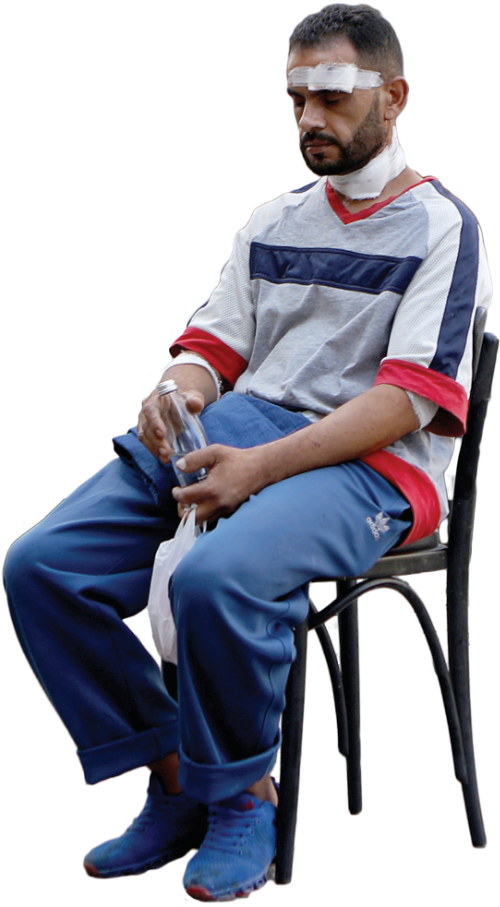
However, many Lebanese say that the politicians and bureaucrats responsible for the disaster should face a reckoning.
“The scale of the destruction is unprecedented, even by Beirut’s sad history of explosions,” Nasser Saidi, a former economy and trade minister and founder of Nasser Saidi & Associates, told Arab News from Beirut.
“On a global scale, this was the most powerful explosion after Hiroshima and Nagasaki, and more devastating than Halifax (1917) and Texas City (1947) where 2,300 tons of ammonium nitrate exploded,” he said.
“The resulting loss of life and injuries to residents has generated deep anger. The ammonium nitrate had been in storage at Beirut port since 2014, posing a clear danger. It was a disaster waiting to happen.
“This is a case of criminal neglect by the authorities and management in charge of the port, customs, the security and judicial authorities and governments. Warnings were given, but they went unheeded. There must be justice and accountability.”
Saidi warned the explosions will deepen the economic, banking and financial meltdown, currency depreciation and soaring inflation. The destruction of the port will hit Lebanon’s imports of food, medicines and essential goods.
“International aid is required not only to address humanitarian needs but to push for political reform,” he said. “The Diab government cannot continue blaming the accumulations of past bad governance.”
Twitter: @rebeccaaproctor


